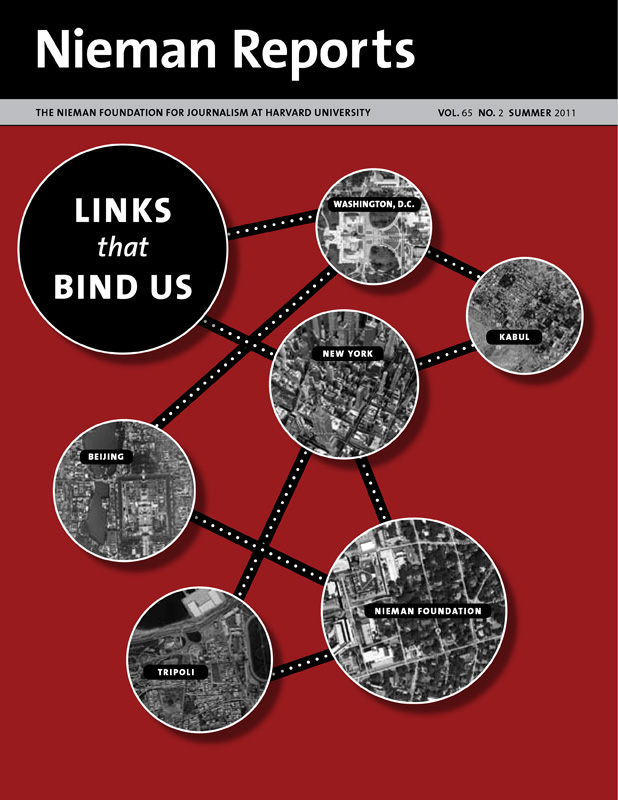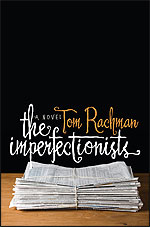
Links that Bind Us
In digital space, journalists are proving to be a powerful force in creating, nurturing and engaging communities. No longer serving only geographic zones, they confront the fragmentation of audience and the need to attract and retain “eyeballs.” Their efforts to embrace and interact with communities are fueled by an instinct to survive. Habits and hobbies, interests and values, political leanings, and sports allegiances are the grist of community formation. Discover the various roles journalists are assuming and how the links we share bind us.

The Imperfectionists: A Novel
Tom Rachman
The Dial Press. 288 Pages.By the end of Tom Rachman's novel about the rise and fall of an English-language newspaper in Rome, Italy, I'm left with a dead dog, a lot of unemployed people, and the sinking feeling that, with journalism, I have chosen the wrong career path. Then I realize that I can always write a novel, though perhaps not so well as Rachman.
While "The Imperfectionists" is about a newspaper, its cast of characters, so flawed and foible-full are what offer an inviting glimpse into the gritty grime of a daily's newsroom. With the narrative freedom that writing fiction offers, Rachman entices readers who normally might not want to enter the microcosm of the newsroom; once readers are there, he employs skillful storytelling to remind them of all that is lost when a daily paper no longer exists. That he does this so well testifies to the literary transformation he's made since he worked as a foreign correspondent for The Associated Press (AP) and an editor at the International Herald Tribune.
In each chapter he explores the life of one person who works for the soon-to-be-doomed paper along with a chapter about the life of one quirky reader. These are brief, sometimes funny, sometimes tragic glimpses into the hearts of individual characters—delicious little morsels that soon melt away to be replaced by the next short narrative. Throughout, Rachman explores the history of the paper and ultimately the story of its failure, something all too prevalent today.
This newspaper in Rome becomes the thread that Rachman uses to connect these memorable characters to one another—and them to larger themes. With his fluid narrative he weaves the reader through the paper's evolution and its changes in leadership, its advances in technology, and the changes in the world outside the newsroom. He is telling this story at a perfect time as newspapers shed staff and costs and, in some cases, shut down their presses altogether. Yet Rachman isn't nostalgic about newspapering; in fact, many of his characters are so irreparably flawed that they are people we wouldn't likely befriend. Or if they don't start out that way, they get there through Rachman's masterful exposition. But if you don't like them, they at least evoke some measure of sympathy.
Then there is the newsroom, a place he shows in all its muck and garbage, hardly in its glory. No Woodwards or Bernsteins sweep through the scenes taking place there. Rachman dives into the reality of the newsroom as a place where when someone steals your chair, the one wonderfully molded to your rear end, this act—rather than some scoop about a gang of terrorists—becomes the main event of the day. His inspiration is clear when one reads what Rachman once said to writer Malcolm Gladwell about working in the AP's newsroom: "And although we were immersed in cataclysmic subjects, one's day was more likely dominated by the mood of the person seated at the next desk."
Rachman deftly takes journalists off a pedestal—a place from which most people already have removed them. Yet he magnificently manages to give us reasons to relate to these journalists, not as flawed reporters and editors but as ordinary people. And through a remarkable feat of writing, he compels us to think of the newspaper in its purest and most valuable form as a composite organism that these flawed individuals create.
The well-known betrayers of journalism's code of behavior—Jayson Blair, Stephen Glass, and Janet Cooke, among others—have had a profound effect on how people think about the news media. Yet every person has flaws; many characters in this novel are inept at life and driven only to be a little less so in a newsroom for what perhaps are less than noble reasons. Rachman explained in the same Gladwell interview that these reasons included "an urgent need for copy and quotes, the terror of enraging one's irritable bosses, the desire for advancement or for prestigious postings." Flawed, and perhaps ignoble as individual journalists may be, there is still great value in what we do, as Rachman deftly illustrates.
Through Rachman's storytelling a valuable record of the human species is produced in clips of daily life and loss. The accumulated weight of these characters' stories—told in brief, direct sentences—encompasses the broad outline of human existence. After being tugged in by the telling of these stories over a morning coffee or on a commute—much like what happens when reading a newspaper—the moment we set the book down our self-absorption with concerns about our own daily dilemmas resumes.
Rachman's characters appear briefly, crossing, overlapping and twisting together with the newspaper at their core. As distinct portrayals, each is poignant, funny, ironic, but when woven into the novel as a whole, the effect is grand and haunting. Maybe this is his message; news—in this case, the act of gathering and distributing it—is what connects us. It pulls us out of our individual shells and forces us to face the world in all of its messiness.
"The Imperfectionists" might be Rachman's way of letting us know that we are losing those connections on a scale and at a rate that ought to concern us. While we are inside of his novel, this is certainly something we understand.
Christina Kim left the Ross School of Business at the University of Michigan and now studies journalism at Emerson College in Boston.


